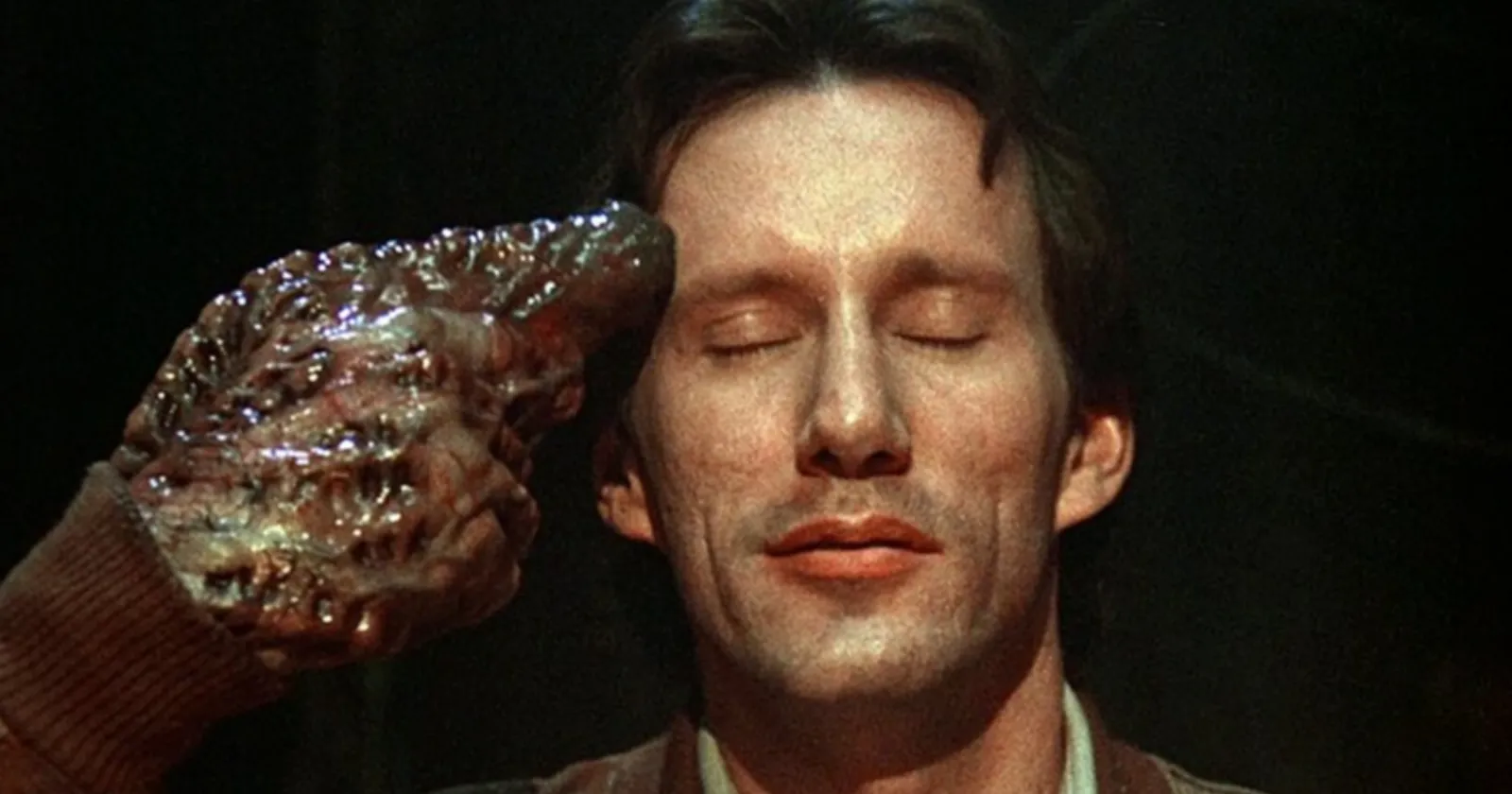Videodrome is a bold, grotesque, and startlingly prescient film, and while it may not be Cronenberg’s most accessible work, it’s certainly one of his most important. A high-concept fever dream of sex, violence, and screen-induced madness, it’s no wonder this is one of the director’s most widely discussed and celebrated films.

‘Videodrome’ Movie Review
David Cronenberg’s Videodrome (1983) stands as one of the most prophetic films of the 1980s—an eerie, hallucinatory vision of media consumption and bodily transformation that only feels more relevant with time. Following on the heels of Scanners (1981), Videodrome sharpens Cronenberg’s blend of science fiction and horror into something stickier, more disturbing, and much more thematically refined. While Scanners laid the groundwork for Cronenberg’s larger ideas, Videodrome is where those ideas are fully realized in a visceral, unforgettable way.
At its center is Max Renn, played by a sweaty James Woods, a sleazy TV executive constantly on the hunt for the next shocking broadcast that will jolt viewers out of their numbness. When he stumbles across a mysterious, seemingly plotless program depicting raw torture and murder—believed at first to be pirated from Malaysia but actually originating in Pittsburgh—he thinks he’s found his golden goose. What he doesn’t realize is that the show, dubbed “Videodrome,” is more than just shock entertainment. It’s a weapon: one that rewires the brain and rewrites reality through the screen.
As Max becomes increasingly consumed by Videodrome, Cronenberg plunges viewers into a nightmare of paranoia, hallucination, and physical mutation. A grotesque slit opens in Max’s abdomen, swallowing guns and videotapes. He begins losing his grip on what’s real and what’s broadcast, as media begins to control his body and mind—literally.
This was Cronenberg’s first film backed by a major Hollywood studio (Universal Pictures), and his most expensive production up to that point. The bigger budget is evident in the polished special effects and broader ambition. It also stars a recognizable cast, with James Woods and Debbie Harry (of Blondie fame), giving it a sheen of mainstream accessibility that makes its grimy, transgressive heart all the more shocking.
But Videodrome isn’t just about body horror for body horror’s sake. Beneath the disturbing imagery lies a deeply prophetic thesis: that the saturation of media into every corner of our lives will alter not just our thoughts but our very bodies. Cronenberg predicted a future where humans and technology merge in unsettling ways—not through slick Silicon Valley dreams, but through something far more invasive and sinister. While Max Renn is glued to CRTs and VHS tapes, the film’s implications have only become more chilling in the age of smartphones and algorithmic content feeds.
It’s also one of Cronenberg’s most influential works. The film’s themes—media manipulation, the merging of flesh and machine, and psychological disintegration—echo through later works like Naked Lunch, eXistenZ, and even 2022’s Crimes of the Future. Videodrome marked a turning point in his career: it’s less of a genre film than his early work like Rabid or Shivers, and more of a fully realized auteur statement.
That said, Videodrome isn’t without its flaws. The first half, which builds a slow-burn dread and dreadfully compelling mystery, is more captivating than the back half, where plot momentum takes over and the film slips into chaotic, less focused territory. Once Max is firmly under Videodrome’s spell and begins enacting its will, some of the thematic clarity gives way to visceral spectacle. Still, even when it loses some narrative cohesion, it never loses its mood—a grimy, surreal atmosphere that burrows under the skin.
At the end of the day, what’s remarkable about Videodrome is how well it holds up—not just as a weird artifact of ‘80s sci-fi horror, but as a film that continues to speak to the anxieties of an always-online world. Its vision of reality being reprogrammed through screens doesn’t just feel relevant. It feels inevitable.
READ MORE MOVIE REVIEWS: Star Trek: The Wrath of Khan, Dune, Heathers
Videodrome is a bold, grotesque, and startlingly prescient film, and while it may not be Cronenberg’s most accessible work, it’s certainly one of his most important. A high-concept fever dream of sex, violence, and screen-induced madness, it’s no wonder this is one of the director’s most widely discussed and celebrated films.
Score: 8/10
Videodrome (1983)
- Cast: James Woods, Debbie Harry, Sonja Smits, Peter Dvorsky, Leslie Carlson
- Director: David Cronenberg
- Genre: Horror, Mystery, Science Fiction
- Runtime: 88 minutes
- Rated: R
- Release Date: February 4, 1983
- Movies Like Videodrome: Infinity Pool, The Substance, Blue Velvet, More Movies Like Videodrome